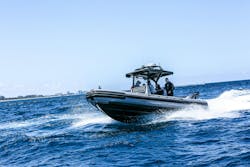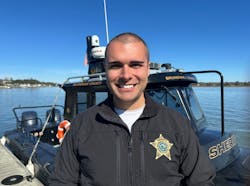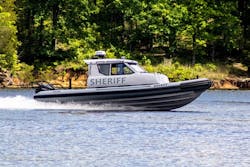The type of watercraft a law enforcement agency purchases depends on the area that agency serves. Bodies of water across the country are patrolled by different types of agencies with different needs. With limited budgets, the need for decision makers to do their research is critical.
This article appeared in the July/August issue of OFFICER Magazine. Click Here to subscribe to OFFICER Magazine.
Blake Young, who was recently named the government sales manager for the U.S. northeast and mid-Atlantic regions for Fluid Watercraft and previously served as a deputy with the Brunswick County Sheriff’s Office Marine Patrol Unit in North Carolina, recently spoke to OFFICER Magazine about what law enforcement agencies should keep in mind when updating their fleets.
Can you give a little background about your time as a marine patrol deputy?
As a marine deputy, I was responsible for 40 miles of North Carolina coastline, 45 miles of the Intracoastal Waterway (ICW), a state port, a nuclear energy plant, a Department of Defense munitions depot and two ferry systems. Our unit responded to all waterway emergencies, including water rescues, submerged vehicles, abandoned or sinking vessels, dive team response and High Value Asset (HVA) escorts to and from ports of call.
How has your role as an officer helped you ease into your new position?
As a former marine deputy, I have firsthand experience with the day-to-day needs of public safety agencies. I faced many challenges in my career, including nighttime navigation, technical rescues, high risk operations and extreme weather. These challenges have given me the ability to understand what types of vessels different law enforcement agencies require, and how Fluid’s boats meet those needs. I’ve also been able to continue to work with agencies and departments I have worked with my whole career, which allows me to feel at home.
How does Fluid Watercraft work with agencies to determine their specific needs?
We start with an in-depth conversation with the agency to understand their mission, operational environment (rivers, open sea, lakes) and details about their work, including typical tasks such as routine patrol, search and rescue, dive operations and any environmental conditions that impact their fleet, like weather and sea state requirements. From there, we work with the agency to determine which of Fluid’s production vessels is the best fit for their operational requirements, budget, and future needs.
How do agencies select what types of watercraft they add to their fleet?
Agencies typically use a fleet of watercraft that meets their needs based on location, typical use, weather and number and types of crew. Larger agencies located on the ocean may need larger boats for open water patrols, whereas smaller inland agencies may look for a smaller boat for lakes or rivers. In some agencies, marine police only patrol, while others provide search and rescue or firefighting.
What things should agencies consider when adding to their marine fleets?
When agencies add to or update their marine fleets, they must consider several critical factors to ensure the new additions meet operational needs and align with strategic goals. These factors include understanding the mission profile and operational environment to choose suitable vessels, incorporating modern technologies for enhanced navigation and communications. We take all these things into account and provide vessels with everything that is needed for a safe and reliable operation. We are revolutionizing the procurement process. Our boats are kept in stock and ready to be launched into the water upon delivery.
Find out more about Fluid Watercraft at officer.com/55001415
About the Author
Paul Peluso
Editor
Paul Peluso is the Managing Editor of OFFICER Magazine and has been with the Officer Media Group since 2006. He began as an Associate Editor, writing and editing content for Officer.com. Previously, Paul worked as a reporter for several newspapers in the suburbs of Baltimore, MD.



